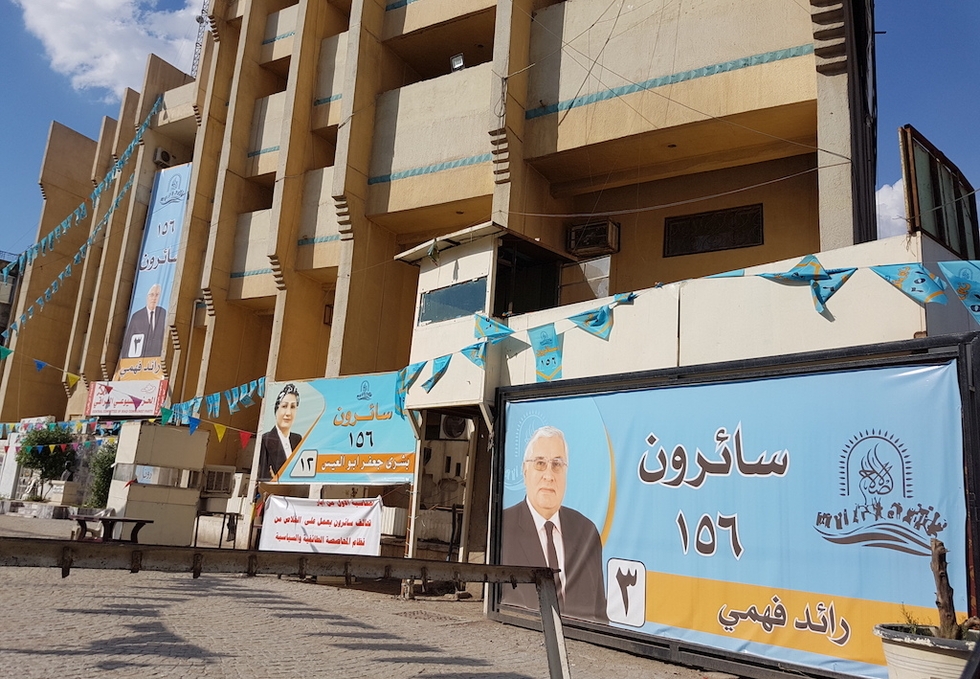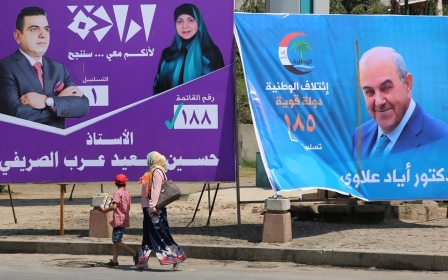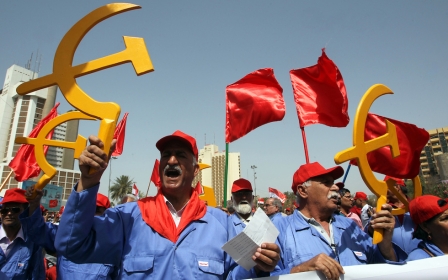Iraq will 'pay price' for war between Iran and the US, warns leftist leader

BAGHDAD - Iraq will "pay the price" for any war between the United States and Iran, warned the head of the Iraqi Communist Party (ICP) on Thursday, as tensions continue to escalate following the US withdrawal from the 2015 nuclear deal.
Raid Jahed Fahmi, a former government minister and parliamentary candidate for the Communist-backed Sairoun Alliance, told Middle East Eye that any war between the two countries would risk stirring up sectarian tensions in the country again - tensions which he suggested had started to dissipate in recent years.
"Iraq should be not be involved in any military conflict on one side or another," Fahmi said, speaking at the ICP's Baghdad headquarters.
"Rather, we have an interest to maintain peace. All political groups [in Iraq] recognise the need to maintain peace, because we know that the first country to pay the price is Iraq.
"Iraqis will pay the price in terms of stability, in terms of terrorism, in terms of destruction and so on."
We cannot accept these new measures against Iran, it is not realistic, it is dangerous
- Raid Jahed Fahmi, ICP General Secretary
US President Donald Trump announced on Tuesday that his country would be withdrawing from the 2015 deal limiting the nuclear capabilities of Iran, claiming that it had "shortcomings" and that Tehran was not holding up its end of the agreement.
The move, which was welcomed by Tel Aviv and Riyadh - and criticised by European leaders - has led to renewed fears of direct conflict between the US, Israel and Iran.
On Thursday, Israeli forces claimed to have wiped out almost all of Iran's military infrastructure in Syria following what were described as heavy exchanges of fire during the night, starting over the Golan Heights.
After the first direct clashes over the Israeli-occupied Syrian territory since 1974, Israel said its barrage on sites throughout Syria was a response to around 20 missiles fired at Israeli forces, which it blamed on Iran's Quds Force. Iran has denied any involvement.
"We hit nearly all the Iranian infrastructure in Syria," said Defence Minister Avigdor Lieberman at a security conference near Tel Aviv.
'Dangerous' measures
Fahmi said that America risked plunging the region into chaos again because of its actions, and warned that any sanctions reimposed on Iran would have a dramatic impact on Iraq, which is diplomatically and economically close to both countries.
"We cannot accept these new measures against Iran, it is not realistic, it is dangerous," he said.
Iraq is currently only two days away from parliamentary elections, the first held after the defeat of the Islamic State group (IS), and there are already fears that the new rise in tensions could impact the outcome of the vote.
Baghdad's streets are lined with posters for different parliamentary candidates, including many who are veterans of the fight against IS.
The largely Iran-backed Hashd al-Shaabi groups, militias who played a key role in fighting IS and now make up the bulk of the Fatah Alliance, have long resented American involvement in the fight against the Islamic State and in Iraq as a whole, and already wholeheartedly support Iranian forces fighting Sunni groups in Syria.
Also visible are advertisements for candidates from the Muttahidoon coalition, a largely Sunni group led by Osama al-Nujeifi, seen as heavily backed by Turkey - another country with ambitions in Iraq.
Fahmi warned that it would be difficult for Iraq to maintain a "politically independent" and "balanced" position between so many different foreign powers if fighting breaks out.
"It did not become a clear issue for the election because it came late, but it will have an impact," he said. "And certainly an impact on the constitution of the government later on. This issue will be there, in the back of their mind."
End to 'confessionalism'
The offices of the ICP in Baghdad are nondescript, although posters of the parliamentary candidates for the Sairoun Alliance are strategically placed outside the building. The interior of the building favours martyred Iraqi communists and modern art rather than Shia or Sunni religious figures, as is the case for many parties in Iraq.
A controversial coalition, the Sairoun Alliance links the ICP with the much bigger Integrity party, which is backed by the influential Shia cleric Muqtada al-Sadr.
The combination of the ultra-secular communists with the Islamist Sadrist movement has provoked anger and surprise on both sides of the divide, but for Fahmi there is a natural social base deriving from the poor, the working class and those angry at the corruption and unemployment currently afflicting the country.
In addition, recent moves by Sadr to reach out to Sunni voters and condemn sectarianism in favour of a national approach have been warmly welcomed by a party that has long boasted of being the lone non-sectarian party in Iraq.
Fahmi, who won't be drawn on his sectarian or ethnic background, said there was a real sense that politics in Iraq was turning away from "confessionalism" and focusing on genuine bread-and-butter issues, such as unemployment, poverty and corruption. A new conflict with Iran would damage a lot of the progress made.
"We have even seen over the last two or three years the representatives of these different communities have lost their credibility. And this applies to the Sunni leaders, the Shia leaders, etc."
He added: "So you see there is an improvement in the consciousness of the people - certain things they used to accept they will not accept any more."
While previous elections have proved hazardous for campaigners, Fahmi said that he had so far not faced negative reactions during election rallies. Despite a longstanding suspicion among many Muslims of "atheist" communism, Fahmi said there was always an audience ready to listen this time.
With Iraq’s elections taking place a week after the 200th birthday of Karl Marx, Fahmi is confident that an ideological shift is coming in Iraq, more in line with the kind of analysis and predictions made by the party's political forebear.
"I think many of [Marx's] ideas are up to date, particularly with regards to globalisation. His ideas are still fresh - they apply now more than they applied 200 years ago," he said.
"We as a party are still inspired by Marx's approach. In our policies, we use this, in terms of analysing Iraqi society, in analysing our priorities, in determining the nature of contradiction - we cannot analyse these properly without using Marxian tools."
Stay informed with MEE's newsletters
Sign up to get the latest alerts, insights and analysis, starting with Turkey Unpacked
Middle East Eye delivers independent and unrivalled coverage and analysis of the Middle East, North Africa and beyond. To learn more about republishing this content and the associated fees, please fill out this form. More about MEE can be found here.






